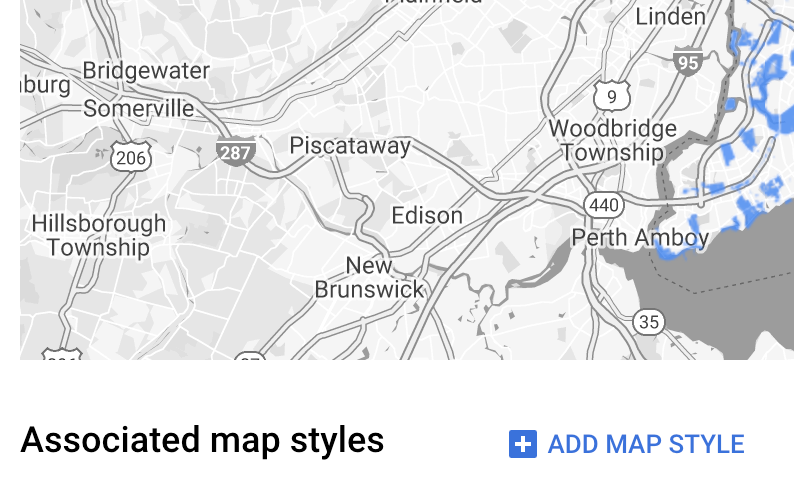Функция FeatureStyleFunction определяет логику для выборочного оформления объектов в наборе данных. Она возвращает FeatureStyleOptions на основе этой логики. Если логика оформления не требуется, вы можете использовать FeatureStyleOptions для непосредственной установки стилей. На этой странице показано, как добавить набор данных на карту и применить к нему стили.
Предварительные требования
Прежде чем продолжить, вам потребуется идентификатор карты, стиль карты и идентификатор набора данных.
Свяжите идентификатор набора данных со стилем карты.
Выполните следующие шаги, чтобы связать ваш набор данных с используемым стилем карты:
- В консоли Google Cloud перейдите на страницу «Наборы данных» .
- Щелкните по названию набора данных. Откроется страница с подробными сведениями о наборе данных .
- Нажмите вкладку « Предварительный просмотр» .
- Прокрутите вниз до пункта "ДОБАВИТЬ СТИЛЬ КАРТЫ" и нажмите на него.

- Установите флажки напротив стилей карты, которые необходимо связать, а затем нажмите СОХРАНИТЬ .
Используйте простые правила стиля.
Простейший способ оформления объектов — передать параметр FeatureStyleOptions для определения атрибутов стиля, таких как цвет, прозрачность и толщина линии. Параметры стиля объектов можно применять непосредственно к слою объектов набора данных или использовать в сочетании с параметром FeatureStyleFunction .
Машинопись
const styleOptions = { strokeColor: 'green', strokeWeight: 2, strokeOpacity: 1, fillColor: 'green', fillOpacity: 0.3, };
JavaScript
const styleOptions = { strokeColor: 'green', strokeWeight: 2, strokeOpacity: 1, fillColor: 'green', fillOpacity: 0.3, };
Используйте правила декларативного стиля.
Используйте FeatureStyleFunction для декларативной установки правил стиля и их применения ко всему набору данных. Применяйте FeatureStyleOptions к объекту на основе значений атрибутов набора данных. Вы также можете вернуть null из функции стиля объекта, например, если хотите, чтобы подмножество объектов оставалось невидимым. В этом примере показана функция стиля, которая окрашивает набор точек на основе атрибутов данных:
Машинопись
function setStyle(/* FeatureStyleFunctionOptions */ params) { // Get the dataset feature, so we can work with all of its attributes. const datasetFeature = params.feature; // Get all of the needed dataset attributes. const furColors = datasetFeature.datasetAttributes['CombinationofPrimaryandHighlightColor']; // Apply styles. Fill is primary fur color, stroke is secondary fur color. switch (furColors) { case 'Black+': return /* FeatureStyleOptions */ { fillColor: 'black', pointRadius: 8 }; break; case 'Cinnamon+': return /* FeatureStyleOptions */ { fillColor: '#8b0000', pointRadius: 8 }; break; case 'Cinnamon+Gray': return /* FeatureStyleOptions */ { fillColor: '#8b0000', strokeColor: 'gray', pointRadius: 6 }; break; case 'Cinnamon+White': return /* FeatureStyleOptions */ { fillColor: '#8b0000', strokeColor: 'white', pointRadius: 6 }; break; case 'Gray+': return /* FeatureStyleOptions */ { fillColor: 'gray', pointRadius: 8 }; break; case 'Gray+Cinnamon': return /* FeatureStyleOptions */ { fillColor: 'gray', strokeColor: '#8b0000', pointRadius: 6 }; break; case 'Gray+Cinnamon, White': return /* FeatureStyleOptions */ { fillColor: 'silver', strokeColor: '#8b0000', pointRadius: 6 }; break; case 'Gray+White': return /* FeatureStyleOptions */ { fillColor: 'gray', strokeColor: 'white', pointRadius: 6 }; break; default: // Color not defined. return /* FeatureStyleOptions */ { fillColor: 'yellow', pointRadius: 8 }; break; } }
JavaScript
function setStyle(/* FeatureStyleFunctionOptions */ params) { // Get the dataset feature, so we can work with all of its attributes. const datasetFeature = params.feature; // Get all of the needed dataset attributes. const furColors = datasetFeature.datasetAttributes['CombinationofPrimaryandHighlightColor']; // Apply styles. Fill is primary fur color, stroke is secondary fur color. switch (furColors) { case 'Black+': return /* FeatureStyleOptions */ { fillColor: 'black', pointRadius: 8 }; break; case 'Cinnamon+': return /* FeatureStyleOptions */ { fillColor: '#8b0000', pointRadius: 8 }; break; case 'Cinnamon+Gray': return /* FeatureStyleOptions */ { fillColor: '#8b0000', strokeColor: 'gray', pointRadius: 6 }; break; case 'Cinnamon+White': return /* FeatureStyleOptions */ { fillColor: '#8b0000', strokeColor: 'white', pointRadius: 6 }; break; case 'Gray+': return /* FeatureStyleOptions */ { fillColor: 'gray', pointRadius: 8 }; break; case 'Gray+Cinnamon': return /* FeatureStyleOptions */ { fillColor: 'gray', strokeColor: '#8b0000', pointRadius: 6 }; break; case 'Gray+Cinnamon, White': return /* FeatureStyleOptions */ { fillColor: 'silver', strokeColor: '#8b0000', pointRadius: 6 }; break; case 'Gray+White': return /* FeatureStyleOptions */ { fillColor: 'gray', strokeColor: 'white', pointRadius: 6 }; break; default: // Color not defined. return /* FeatureStyleOptions */ { fillColor: 'yellow', pointRadius: 8 }; break; } }
Примените стиль к слою пространственных объектов набора данных.
Чтобы применить стили в функции стилей объекта:
- Чтобы получить слой объектов набора данных, вызовите метод
map.getDatasetFeatureLayer(), передав идентификатор набора данных. - Примените стиль, задав параметры стиля объекта (например,
styleOptions) или функцию (например,setStyle) на слое набора данных.
Машинопись
// Dataset ID for NYC park data. const datasetId = 'a75dd002-ad20-4fe6-af60-27cd2ed636b4'; const datasetLayer = innerMap.getDatasetFeatureLayer(datasetId); datasetLayer.style = styleOptions;
JavaScript
// Dataset ID for NYC park data. const datasetId = 'a75dd002-ad20-4fe6-af60-27cd2ed636b4'; const datasetLayer = innerMap.getDatasetFeatureLayer(datasetId); datasetLayer.style = styleOptions;
Удалить стиль из слоя
Чтобы удалить стиль из слоя, установите для style null :
featureLayer.style = null;
Вы также можете вернуть null из функции стилизации объектов, например, если хотите, чтобы подмножество объектов оставалось невидимым.
Добавить текст об авторстве
При отображении загруженных наборов данных на Google Maps на вашей карте должны быть указаны все необходимые данные об авторстве. Текст с указанием авторства не должен закрывать или мешать отображению логотипа Google.
Один из способов добавить текст с указанием авторства — использовать пользовательские элементы управления для размещения произвольного HTML-кода в стандартных местах на карте. Следующие фрагменты кода демонстрируют HTML и CSS, используемые для указания авторства в этом примере:
<gmp-map center="40.757815, -73.933123" zoom="11" map-id="5cd2c9ca1cf05670" map-type-control="false"> <div id="attribution" slot="control-block-end-inline-start">Data source: NYC Open Data</div> </gmp-map>
#attribution { background-color: rgba(255, 255, 255, 0.7); font-family: "Roboto", "Arial", "sans-serif"; font-size: 10px; padding: 2px; margin: 2px; }

